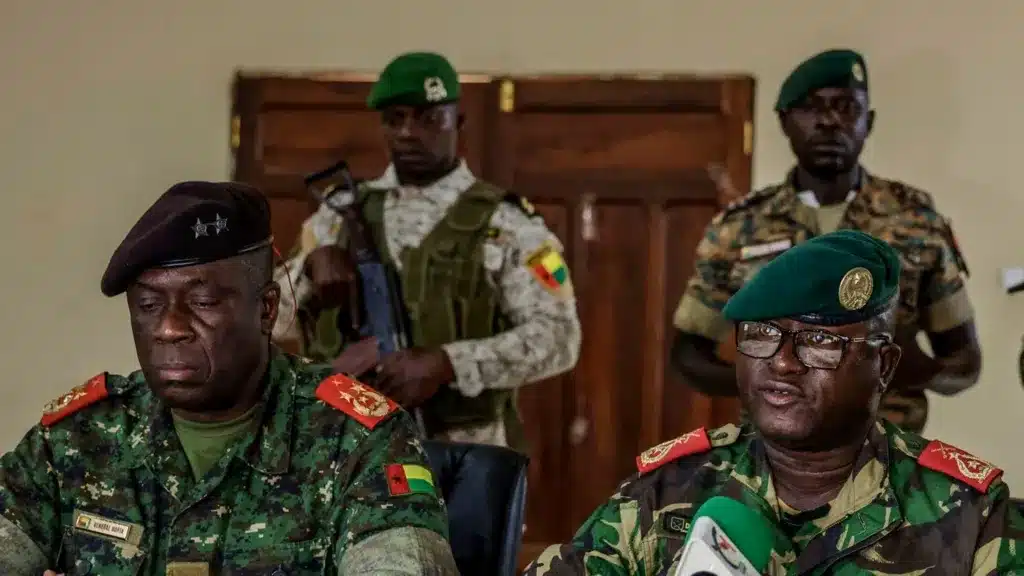Guinea-Bissau descended into political turmoil on Wednesday as soldiers appeared on state television to announce that the military had seized power, accusing President Umaro Sissoco Embaló of attempting to manipulate the results of the country’s presidential election. The takeover came amid reports of gunfire, roadblocks and heightened tension across the capital, Bissau.
In a broadcast delivered by military spokesperson Diniz N’Tchama, the coup leaders accused the president of orchestrating a plan to destabilise the country by influencing Sunday’s election results. N’Tchama claimed the alleged plot involved national political actors, foreign operatives and a “well-known drug baron,” though he provided no specific evidence to support the accusation. He announced the immediate suspension of the electoral process, closure of all borders, enforcement of a nationwide curfew and a halt to media activities.
Read Also:
ECOWAS, Guinea-Bissau unveil ADP phase II for CWD
Tinubu advocates for stronger maritime security in Gulf of Guinea
President Embaló later confirmed to France 24 that he had been “deposed,” in line with reports from international agencies indicating that he was in military custody. The French publication Jeune Afrique quoted him as saying he had been arrested in a coup led by the army chief of staff, though he insisted he had not been harmed. An international election observer told the Associated Press that the president had quietly informed contacts that he was being held by soldiers.
Hours before the televised announcement, heavy gunfire erupted around the presidential palace, the national electoral commission and the interior ministry. Security sources, speaking anonymously, said a group of armed men attempted to storm the presidential palace, leading to a fierce exchange of gunfire with guards. Soldiers subsequently sealed off the surrounding streets, erecting checkpoints and ordering civilians to disperse. Witnesses described scenes of panic as residents fled amid the sound of gunshots. The U.S. mission in Guinea-Bissau issued a security alert noting the proliferation of military checkpoints and confirming the use of tear gas by security forces.
The political crisis intensified after both Embaló and his main challenger, Fernando Dias da Costa, declared victory in Sunday’s presidential and legislative elections. Official provisional results were not expected until Thursday, deepening uncertainties as both sides claimed to have won. Embaló, who was elected in 2020 after a disputed contest, had already faced controversy after his term was extended earlier this year by the Supreme Court due to election delays.
The events mark yet another chapter in Guinea-Bissau’s long history of political instability. Since independence from Portugal in 1974, the country has suffered repeated military coups, attempted coups and political assassinations. Embaló has previously claimed to have survived three coup attempts since taking office. Just last month, authorities announced the arrest of senior officers alleged to be plotting to overthrow the government, underscoring the deep fractures within the armed forces. The country’s chronic instability has also been fuelled by its reputation as a key transit point for cocaine smuggled between Latin America and Europe. Organised crime networks have deeply penetrated political structures, complicating efforts to stabilise governance.
The African Union and the Economic Community of West African States (ECOWAS) expressed deep concern over the latest developments, confirming that electoral officials had been arrested and calling for their immediate release. Portugal, the former colonial power, urged authorities to restore constitutional order and allow the vote-counting process to proceed without interference. Observers noted that it remains unclear whether the military faction responsible for the coup has the full backing of the armed forces, which have historically been fragmented along political and regional loyalties.
This latest upheaval comes as Africa grapples with a resurgence of military takeovers. Between 2020 and 2024, the continent recorded more coups and attempted coups than any other region in the world. Countries in West and Central Africa, including Mali, Burkina Faso, Niger, Chad, Guinea and Gabon, have witnessed similar transitions, triggered by deteriorating security conditions, economic hardship, public anger toward political elites and the erosion of democratic norms. Analysts warn that the growing geopolitical competition involving Russia, China and Western countries has further complicated regional politics, emboldening militaries to act with reduced fear of international consequences.
As of Wednesday night, uncertainty continued to hang over Bissau. Soldiers controlled key state institutions, the president remained in custody and residents feared further unrest. The abrupt suspension of elections has cast serious doubt over the country’s democratic trajectory, raising concerns that Guinea-Bissau may once again enter a prolonged period of instability.
The man identified as the leader of the coup, Dinis Incanha, previously served as the Head of the Military Office of the Presidency. In that role, he oversaw strategic military coordination and presidential security operations, which placed him in a position of considerable influence within the armed forces. His proximity to the presidency and his command responsibilities are believed to have given him both the access and leverage necessary to orchestrate the takeover.
What happens next will determine whether Guinea-Bissau moves toward another military-led transition or faces deeper fragmentation. For now, the small West African nation finds itself at the center of yet another struggle between democratic aspirations and the entrenched power of the military.



